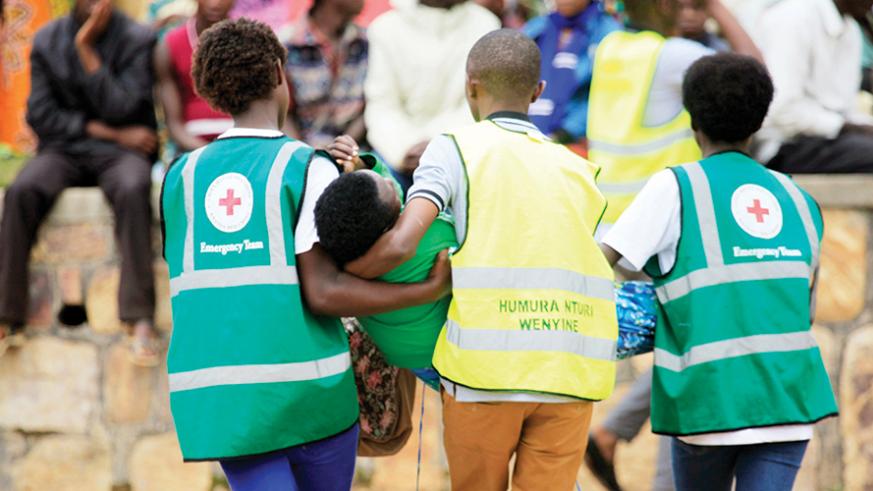
By Nasra Bishumba, The New Times
Almost a year since Rwanda confirmed its first Covid-19 case, mental health experts in organisations of the survivors of the 1994 genocide against the Tutsi say that mental illness challenges have been exacerbated by the pandemic.
According to Rwanda Biomedical Centre (RBC), depression prevalence is at 11.9 per cent within the general population and as high as 35.6 per cent are genocide survivors. This means one in three genocide survivors faces trauma.
Prevalence of Post-Traumatic Stress Disorder (PTSD) stands at 3.6 per cent.
Speaking to The New Times by telephone, Aimée-Josiane Umulisa, the Healing Activities Coordinator at Rwandan Graduate Genocide Survivors Organisation (GAERG), says that restrictions that are put in place to protect Rwandans from contracting the virus have left some of the survivors lonely and heightened their fear and anxiety.
GAERG works with about 2,500 people who are split into 168 groups spread all over 25 districts countrywide.
She explains that the members of these groups face different mental health challenges including depression, PSTD, alcoholism and anxiety among others.
70 per cent of the 2,500 are battling both PTSD and depression.
The challenges
Umulisa explained that with the outbreak of Covid-19, the biggest challenge that her organisation is dealing with at the moment is with survivors aged between 60 and 80 who are battling serious mental health related issues like migraines, insomnia, extreme anxiety, fear with many thinking that they are about to die.
The same group is the most vulnerable to the virus.
“The challenge right now is that they cannot congregate in their groups where they find solace in talking freely with peers. That means that they are now battling loneliness which mostly escalates into other health concerns,” she said.
She pointed out that they had incorporated the use of phones to reach these people but that also comes with its own set of challenges.
“There are very many beneficiaries who live in remote areas who do not own phones. However, we have 200 community-based counselors and 20 psychologists who live within their communities that may be reachable whenever the patient’s issues escalate,” she explained.
Need for livelihood support
The Coordinator of Avega Counselling Project, Louise Bajeneza, told The New Times that her office mostly fields calls from members who are struggling for basics livelihood requirements.
Avega is the association of widows of the Genocide against the Tutsi.
Bajeneza explained that even before, survivors were living with pain from their traumatic experience during the genocide but the outbreak of the pandemic came in and worsened the situation.
She said that one of the biggest challenges for most has been the stress that came with their limited opportunities to work and fend for their families.
“We are basically dealing with people who tell you that they are thinking too much because they only manage to feed their families when they work. They are unable to do so due to the changes that came with Covid-19. Some completely lost their jobs. It can be stressful,” she said.
Financial constraints
The Executive Secretary of IBUKA, the Umbrella Organisation of genocide survivors, Naphtal Ahishakiye said in an interview that there are two types of people dealing with mental illness.
He explained that the first category consists of people who occasionally break down based on a particular incidence while the other category is of people who live with mental illness and are assigned psychologists who deal with them on a daily basis.
Ahishakiye pointed out that while dealing with members on the grassroots level to keep a keen eye on survivors who need urgent medical help has worked in some cases, it has met challenges due to financial constraints.
“These organisations don’t have sufficient funds to do these follow-ups. We are basically telling these people to volunteer and use their resources to make these calls, to check in on the patients because we don’t give them facilitation,” he said.
He said that because of this, the survivors are all not being reached.
“In 2019, we had about 3,656 people who had such challenges and about 3,087 of them got immediate onsite support while 569 serious cases were transferred to hospitals. In 2020 after the pandemic hit, we had about 1200 and 401 got transferred to hospitals,” he said.
Under-funded sector
The Director of Survivors Fund (SURF); Samuel Munderere said that the Covid-19 crisis has increased mental health challenges among the survivors, where lockdowns enforced by the government to mitigate the spread of the virus have left some without the means to access their medication.
He also pointed out the challenge that some survivors who were participating in group therapy sessions were unable to continue due to restrictions on movement, setting most of them steps back on their progress.
He reminded that the current challenges that survivors are facing is a reminder of the funding gaps in mental healthcare.
“Considering that globally, mental healthcare is underfunded and its effects underestimated, there is a big funding gap that needs to be addressed fast because the effects of Covid-19 are going to be felt for years to come,” he said.
The Director of the Psychiatric Care Unit at the Rwanda Biomedical Center, Dr Jean-Damascène Iyamuremye, told The New Times in a previous interview that there is need for more funds to be injected in this area to support treatment.
“Mental health is still underfunded yet we need to coordinate activities of treatment and prevention, fighting stigma against victims and we need to raise awareness regarding access to treatment,” he said.
